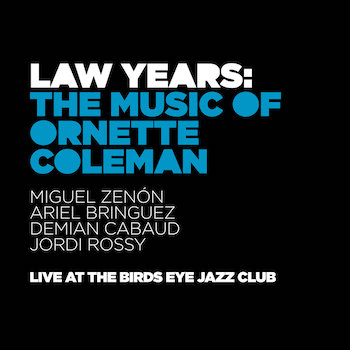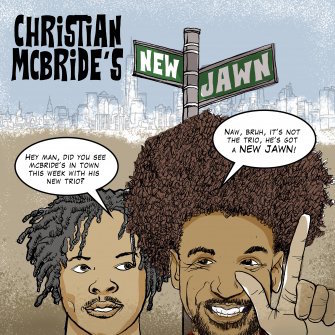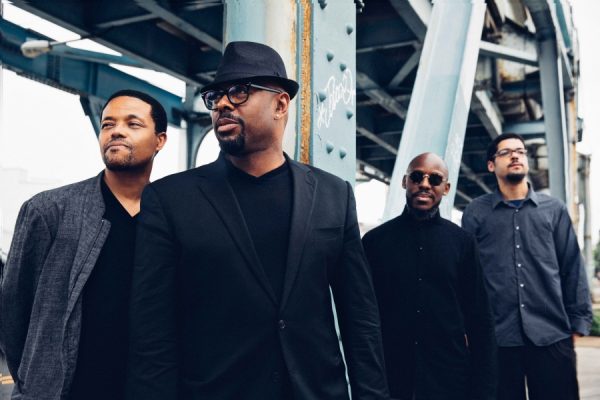Jazz Album Review: Miguel Zenón’s Law Years Band & Christian McBride’s New Jawn Band
By Steve Elman
Two pianoless quartets + two restless leaders = some of the best music of the last few years.

Saxophonist Miguel Zenón. Photo: Noah Shaye.
Two of the most creative minds in jazz have recently chosen to work in pianoless quartets, and the results are among the most stimulating music to come along in years.
Bassist Christian McBride’s New Jawn is a team of mighty players that has achieved remarkable rapport over its five-plus years of work, with a very satisfying CD release from 2017, a lot of interesting concert excerpts on YouTube, and a streamed performance that had limited release in April 2021 as part of a series sponsored by the Celebrity Series of Boston.
Saxophonist Miguel Zenón’s Ornette Coleman tribute project appears at this moment to be a one-off, but it deserves to spawn something more lasting. His newest release is a digital album drawn from an all-Ornette concert two years ago, and it is one of the best recordings to appear so far this year.
Zenón’s group explicitly honors Coleman, but McBride’s band draws on an Ornettish approach for about half of its repertoire. Listening to these ensembles side-by-side shows that Coleman’s ideas still provide plenty of inspiration, and in the right hands, they can be springboards for brilliance.
In each case, the pianoless group is just one of the leader’s many musical concepts. If we only had an active club scene, we could hope for the opportunity to see each of these bands here in our town sometime soon. The best we can do in the moment is hear and enjoy them as they have been captured so far and hope that their leaders’ restless spirits won’t lead them too far away by the time a new normal is established.
Miguel Zenón has pursued project after project with remarkable commitment, and this newly issued Coleman tribute is another great example. Many of his recordings have concentrated on meticulously researched explorations of his Puerto Rican heritage, but he has also presented programs concentrating on works of past jazz masters, tried his hand at long-form composition, collaborated with a string quartet (Arts Fuse review of Yo Soy la Tradición), and most recently performed duets with Venezuelan pianist Luis Perdomo (Arts Fuse review of El Arte del Bolero).
Coleman’s work has figured in Zenón’s musical history for a long time. Zenón was part of the SF Jazz Collective when they undertook a season-long exploration of Coleman’s music in 2004. Although Zenón did not arrange any of the tunes on that tour, it gave him the chance to play some Coleman classics night after night — “Una Muy Bonita,” “Lonely Woman,” “When Will the Blues Leave,” and “Peace.”
In 2011, Zenón undertook another deep dive into the Coleman book for one of his “Caravana Cultural” tours in Puerto Rico — a series giving listeners in rural areas of the island the opportunity to hear classic jazz repertoire in new interpretations. YouTube videos of two of those performances – “Una Muy Bonita” and “Dee Dee” — show just how adept he was at investing these tunes with his own vibrant personality (see below for the links).
But his newest visit to Coleman’s music takes big steps beyond the earlier ones. The new release, called Law Years, is as sophisticated a tribute as Coleman has ever received. As with so many of Zenón’s projects, this one shows a deep understanding of the basic material and a creative spirit’s ability to take the Past into the Present.
So far, Law Years is available only as a digital download or via streaming services. It deserves to have a more permanent life in CD form.
 The recording comes from a live date at the Bird’s Eye Jazz Club in Basel, Switzerland, in May 2019. There isn’t a single Coleman “hit” in the repertoire — of all of the tunes I mention above, only “Dee Dee” (itself not one of the best-known compositions) made it into the book for this date. Instead, Zenón carefully selected works from a wide swath of Coleman’s career — two tunes from the ’50s (“Free” and “Giggin’”), four from the ’60s, and two from the great Science Fiction session in 1971.
The recording comes from a live date at the Bird’s Eye Jazz Club in Basel, Switzerland, in May 2019. There isn’t a single Coleman “hit” in the repertoire — of all of the tunes I mention above, only “Dee Dee” (itself not one of the best-known compositions) made it into the book for this date. Instead, Zenón carefully selected works from a wide swath of Coleman’s career — two tunes from the ’50s (“Free” and “Giggin’”), four from the ’60s, and two from the great Science Fiction session in 1971.
Zenón’s meticulous crafting extended to the choice of side players. He chose tenor saxophone for the other horn, echoing Dewey Redman’s presence in many of the later Coleman groups. Redman’s approach was similar in many ways to Coleman’s — dry, hard-edged, penetrating — which gave those later groups a character distinct from the sound of the bands featuring trumpeter Don Cherry.
But Zenón didn’t want his group to imitate Coleman’s approach, and his choice of Ariel Bringuez as his up-front partner was inspired. Bringuez’s tenor is appealingly soft, almost like Wardell Gray or Lucky Thompson playing Ornette. This gives the ensemble a lovely richness.
It is necessary for the rhythm players in a Coleman-inspired band to be much more than timekeepers, and Zenón again chose well. Bassist Demian Cabaud is as much a partner here as Charlie Haden was in Coleman’s band. Drummer Jordi Rossy is more explosive than either Billy Higgins or Eddie Blackwell (Coleman’s mainstays before his son Denardo took over the drum chair), and his approach gives Zenón’s band extra force.
Zenón also took care to give variety to his interpretations of the tunes. Fans of virtuoso playing will get what they want, especially in the two burners that lead off the set, “Tribes of New York” and “Free.” “Giggin’” shows Ornette’s debt to bebop. “Broken Shadows,” one of Coleman’s keening ballads, is given a very sensitive reading, with the melody paramount, emphasized first by Bringuez under the leader’s solo, and then by Zenón as Bringuez improvises.
One in-depth description will have to suffice here to give you a sense of how much there is to savor throughout this recording.
“Giggin’” was originally recorded in 1959 for Contemporary, in the sessions that produced Coleman’s second LP, Tomorrow Is the Question! As with his other tunes from that era, this one is solidly in tempo and its bebop lineage is obvious. Cabaud lays down a very swinging foundation as soon as the solos begin, and Rossy is wonderfully sensitive to the ebbs and flows in each soloist’s offering. Zenón and Bringuez both put space into their improvisations, which gives you time to savor their thinking. Zenón begins in medium tempo, first in Ornette’s spirit but then very much not Ornette, as he doubles the tempo and sets up a back-and-forth approach — moving away from strict adherence to swing feel, then veering back. There’s a particularly interesting moment where he plays a little figure in tempo, then plays it faster out of tempo, and then transposes it away from the harmonic center he’s just established. Zenón concludes the solo with a phrase taken from the theme, which Bringuez immediately harmonizes to start his own solo. The tenor saxophonist’s improv is also a gem, and he picks up some of the back-and-forth of the leader’s approach. To accompany Cabaud’s bass solo, Rossy drops his accompaniment back into the lightest possible percussion. Cabaud gradually eases himself into a give-and-take with Rossy in the same delicate spirit. A long rest leads into a drum flourish and the return of the head.
Of necessity, a bassist-leader must take a role quite different from a leader who is an up-front player. Christian McBride’s groups all have an appealing sense of communal commitment, and the players he chooses seem to be looking over their shoulders to be sure they are going in the direction he wants.
The choice of sidemen for McBride’s pianoless group, New Jawn, shows how sensitive he is to the idea of a collective sound. Although the spirit of Ornette hovers over some of their tunes, this is not a Coleman tribute band, and McBride does not emulate Coleman’s approach to the front line. On the one hand, he chose trumpeter Josh Evans, who has a sound that sometimes echoes that of Don Cherry, but he balances that with the weight of an extrovert tenor saxophonist, Marcus Strickland. Nasheet Waits, who has been a very forceful drummer in other bands, holds his fire a bit in New Jawn and responds carefully to what is going on around him.
New Jawn is represented on YouTube with some fascinating clips that surround their first recording date and give a sense of their progression as an ensemble (see links below).
The first available clip is from an SFJAZZ performance in 2016, where they play Thelonious Monk’s abstract blues “Raise Four.” The group is already a tight unit, but it operates here more conventionally than it does in later examples, sticking to the blues changes and soloing in sequence. They take a few chances opening up the rhythm, but essentially it comes across as a solid working quartet. Incidentally, McBride’s solo on this one is choice — very good-humored, with simply beautiful technique — and it is just one of the substantial contributions he makes to the group when he gets the spotlight later on.
 Some months later, in May 2017, New Jawn recorded its debut CD, which dealt almost exclusively in original material. Each member of the quartet contributed two tunes, and the set was rounded out with the surprising choice of “Sightseeing,” a Wayne Shorter original from the Weather Report book, which prompted one of their most powerful recorded performances to this point. Almost all of the originals show the group stretching the limits of the tradition, with Ornettish approaches evident on McBride’s “Walkin’ Funny,” Waits’s multidimensional “Ke-Kelli Sketch,” and Strickland’s “The Middle Man.” The most conventional material is Evans’s “Ballad of Ernie Washington,” a tune in the spirit of Benny Golson’s “I Remember Clifford,” possibly intended as a requiem for Monk, who used the name “Ernie Washington” to get gigs when he was denied NYC club access after the revoking of his cabaret card.
Some months later, in May 2017, New Jawn recorded its debut CD, which dealt almost exclusively in original material. Each member of the quartet contributed two tunes, and the set was rounded out with the surprising choice of “Sightseeing,” a Wayne Shorter original from the Weather Report book, which prompted one of their most powerful recorded performances to this point. Almost all of the originals show the group stretching the limits of the tradition, with Ornettish approaches evident on McBride’s “Walkin’ Funny,” Waits’s multidimensional “Ke-Kelli Sketch,” and Strickland’s “The Middle Man.” The most conventional material is Evans’s “Ballad of Ernie Washington,” a tune in the spirit of Benny Golson’s “I Remember Clifford,” possibly intended as a requiem for Monk, who used the name “Ernie Washington” to get gigs when he was denied NYC club access after the revoking of his cabaret card.
My Arts Fuse colleague Michael Ullman provided more detail on the recording in his Arts Fuse review.
YouTube clips after May 2017 are all devoted to tunes from this session.
In a partial recording from Umbria, a couple of months after the debut recording was made, they play Evans’s “Pier One Import,” and it appears that the horn players are still reading the theme and chords from sheet music, although the performance is strong and cohesive.
In a club date recorded at the Waikiki branch of NYC’s Blue Note in June 2018, a bit less than a year later, the music stands are gone and the group owns the material. The Honolulu take on Waits’s “Ke-Kelli Sketch” is one of the freest New Jawn performances available so far, remarkable for its differences from other takes and for its length — the 15-minute excerpt here ends suddenly, and the tune probably went on for several minutes more.
“The Ballad of Ernie Washington” from the Malta Jazz Festival (July 2018) shows how elegantly Evans has settled into sensitive interpretation of his own beautiful ballad, and it has the only recorded example so far of Strickland playing soprano saxophone with the band.
Several New Jawn tunes have been posted from a September 2018 live performance in the studios of KNKX (Tacoma / Seattle), with the rapport obvious and the control impressive. “Pier One Import” and “The Middle Man” are both well worth hearing, but “Ke-Kelli Sketch” is instructive because it shows how beautifully the free approach on display in Waikiki has been integrated into an organic and flowing whole.

New Jawn under the Brooklyn Bridge. Left to right: drummer Nasheet Waits, bassist-leader Christian McBride, saxophonist Marcus Strickland, trumpeter Josh Evans. Photo: Anna Webber.
One more clip, recorded in 2019 at the Sorties Jazz Nights in Montreal a year later, shows the band solid as granite on McBride’s “John Day,” with an extended outing by Strickland on bass clarinet. It gives a sense of the rapport the group had by the time they recorded the concert streamed by the Celebrity Series, which came from late last year at the Baryshnikov Arts Center in NYC.
Both Zenón’s Law Years group and McBride’s New Jawn demonstrate that what Ornette Coleman pioneered — an approach to improvisation that freed musicians from chord structures and modal frameworks, allowing them to move seamlessly from tonal center to tonal center as they wished — has become part of basic jazz language. Let’s hope that the next few years will give us more explorations along these lines by all kinds of jazzpeople, ultimately leading a proper commemoration in 2030, the centennial of Coleman’s birth.
More immediately, it would be a pleasure to hear more performances by these two groups in nearby venues. We are looking to the Celebrity Series to continue its commitment by booking McBride and Zenón once again — hopefully before too many months pass.
More:
In just a few days, the Celebrity Series of Boston is offering another example of its outstanding programming in a series of four one-time-only streaming events, so mark your calendars.
Over the past several years, the Series has annually sponsored the Stave Sessions, a collection of springtime concerts that spotlight cross-cultural traditions that often connect to jazz. This year, the Stave Sessions are virtual, which will give listeners with big ears a convenient way to explore some fascinating music made by some of the world’s most adventurous musicians.
Selecting any one night from the four Stave Sessions streams does something of an injustice to the others, but my own ears are most interested in the three groups being streamed on Friday, April 23, 2021, beginning at 7:30 p.m. (ET)
Singer Sid Sriram, whose work is described as a blend of influences from the Tamil, R&B, blues, gospel, pop, and Carnatic music traditions, will be heard in a set recorded in Chennai, India. Then the Spektral Quartet, a group that has previously collaborated with Miguel Zenón and George Lewis, among others, will “travel from 16th century Spain to present-day Chicago” in a program that will include a work by jazz-oriented cellist Tomeka Reid. Finally, Mark Lettieri, guitarist for Snarky Puppy, will lead a group that promises to offer “blues, jazz, rock, and funk.”
Maria Golia’s important biography Ornette Coleman: The Territory and the Adventure was published early in 2020. The Fuse’s Steve Provizer marked that event with a review of the book and a companion contemplation of Ornette’s importance.
Here are links to the online performances described above:
Miguel Zenón, as; Avishai Cohen, tp; Ben Street, b; Adam Cruz, dm — two performances from Zenón’s “Caravana Cultural,” recorded in Adjuntas, Puerto Rico, in October 2011:
“Dee Dee”:
https://music.youtube.com/watch?v=NgTr8Z2ioMk&list=PL2Z8vT6D3wiTqD3SMa2lP0nOyJ5s62iKm
Miguel Zenón, as; Ariel Bringuez, ts; Damien Cabaud, b; Jordy Rossy, dm; rec. at Bird’s Eye Jazz Club, Basel, Switzerland, May 2019: Law Years (digital album) on Zenon’s bandcamp site
———–
New Jawn (Christian McBride, b; Josh Evans, tp; Marcus Strickland, ts / ss / bcl; Nasheet Waits, dm)
“Raise Four” (Thelonious Monk), rec. at SFJAZZ, San Francisco, 2016:
https://www.youtube.com/watch?v=F4AA0Cy7FjM
“Pier One Import” (Evans) [partial recording], rec. at Umbria Jazz, Umbria, Italy. July 2017:
“Ke-Kelli Sketch” (Waits) [partial recording], rec. at Blue Note Wakiki, Honolulu, June 2018:
https://www.youtube.com/watch?v=pGkINaAX7x8
“The Ballad of Ernie Washington” (Evans), rec. at Malta Jazz Festival, Valletta, Malta, July 2018:
https://www.youtube.com/watch?v=PAVTpVWJiXI
“Pier One Import” (Evans) / “Ke-Kelli Sketch” (Waits) / “The Middle Man” (Strickland), rec. at KNKX studios, Seattle, September 2018:
“John Day” (McBride), rec. at Sorties Jazz Nights, Montreal, September 2019:
https://www.youtube.com/watch?v=-NshuP4Epio
Steve Elman’s more than four decades in New England public radio have included ten years as a jazz host in the 1970s, five years as a classical host on WBUR in the 1980s, a short stint as senior producer of an arts magazine, 13 years as assistant general manager of WBUR, and fill-in classical host on 99.5 WCRB.
Tagged: Celebrity-Series, Christian McBride, Law Years, Miguel Zenón, Ornette Coleman
